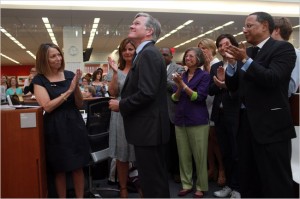New York Times Appoints First Female Editor – Jill Abramson
June 3, 2011
 New York Times – Jill Abramson, a former investigative reporter who rose to prominence as a Washington correspondent and editor, will become the next executive editor of The New York Times, succeeding Bill Keller, who is stepping down to become a full-time writer for the paper.
New York Times – Jill Abramson, a former investigative reporter who rose to prominence as a Washington correspondent and editor, will become the next executive editor of The New York Times, succeeding Bill Keller, who is stepping down to become a full-time writer for the paper.
Ms. Abramson has been one of Mr. Keller’s two top deputies since 2003, serving at his side as he steered The Times through a period of journalistic distinction and economic distress. Mr. Keller said that with the paper’s finances now on surer footing, he felt at ease handing the reins to Ms. Abramson.
The move was accompanied by another shift in senior management. Dean Baquet, the Washington bureau chief and former editor of The Los Angeles Times, will become the managing editor for news.
Arthur Sulzberger Jr., the paper’s publisher and the chairman of The New York Times Company, thanked Mr. Keller, calling him a “truly valued partner” in a speech Thursday morning in the Times newsroom, where the staff stood shoulder to shoulder to hear the publisher announce the first changeover in the top editing jobs in eight years.
To read the full New York Times article, click here.
Turning toward Ms. Abramson, who will become the first female editor in the 160-year history of The Times, Mr. Sulzberger said, “Jill, Bill’s decision to step down may be bittersweet. But the thought of you as our next executive editor gives me and gives all of us great comfort and great confidence.”
The appointments are effective Sept. 6. John M. Geddes, 59, will continue in his role as managing editor for news operations.
Over the course of Mr. Keller’s tenure, the paper won 18 Pulitzer Prizes and expanded its online audience to some 50 million readers worldwide. But the economic downturn and the drift of readers and advertisers to the Web also forced the paper to lay off members of the news staff and tighten budgets considerably.
“A couple of years ago, everybody was wringing their hands about doomsday for the news business,” Mr. Keller said to the staff, his voice emotional at times. “People talked, some of them rather smugly, about even The New York Times not being long for this world. And now you look around, and we are economically sturdy. We are rich in talent. We are growing.”
Mr. Keller will continue to write for The Times Magazine and as a columnist for the new Sunday opinion section, which will make its debut this month. Mr. Sulzberger said he accepted Mr. Keller’s resignation “with mixed emotions,” adding that the decision to leave was entirely Mr. Keller’s.
Mr. Keller, 62, is still a few years shy of the paper’s mandatory retirement age for senior executives, but he held the top job for roughly the same period of time as Max Frankel and Joseph Lelyveld, two of the editors who preceded him. Mr. Frankel and Mr. Lelyveld returned to the newsroom for the announcement.

